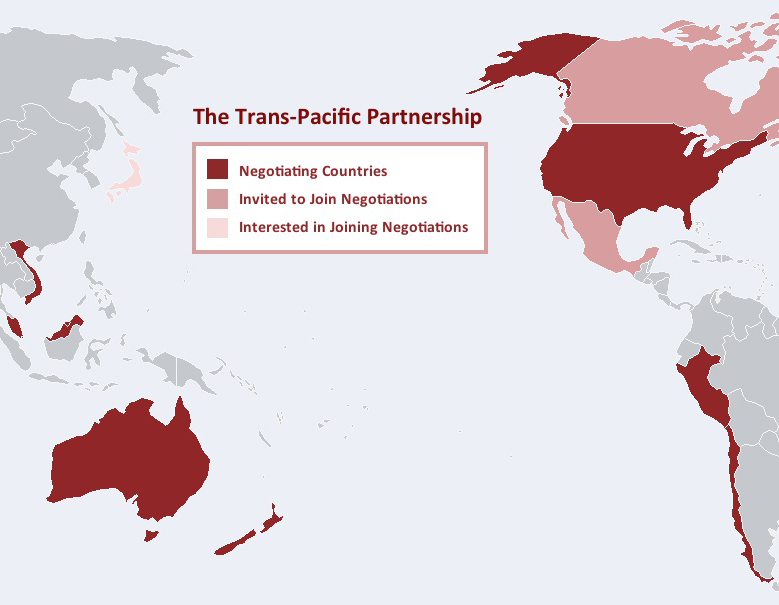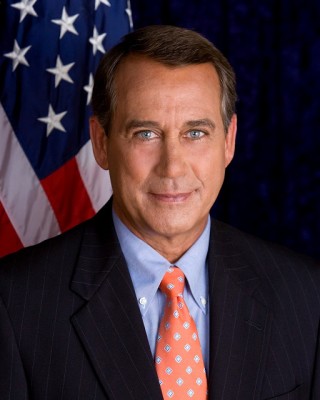Table of Contents for This Article
- Intro: Why The TPP is Like Eating a Chipotle Burrito
- The Tortilla: Trade Promotion Authority
- The Rice and Beans: Trade Adjustment Assistance
- The Meat: Barriers to Trade
- Regulations on drugs, movies, music, and software
- Lettuce, Cheese, Salsa: Strange Political Bedfellows
- Supporters of TPP
- Opponents of TPP
- Get a Beer: Why TPP Now?
- Why President Obama Wants the TPP Now
- Why Republicans Want the TPP Now
- The Latest News
The Trans-Pacific Partnership (TPP) is a huge international trade deal between the US and 11 other countries (Australia, Brunei, Canada, 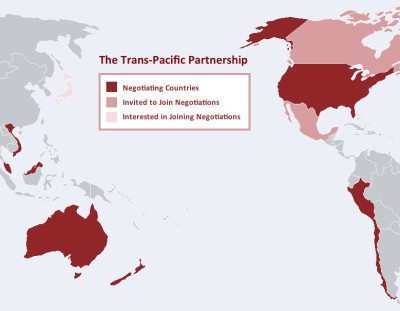 Chile, Japan, Malaysia, Mexico, New Zealand, Peru, Singapore, and Vietnam) that will impact 40% of our planet’s economy. Don’t let your eyes glaze over yet. Here’s how the TPP is like eating at Chipotle.
Chile, Japan, Malaysia, Mexico, New Zealand, Peru, Singapore, and Vietnam) that will impact 40% of our planet’s economy. Don’t let your eyes glaze over yet. Here’s how the TPP is like eating at Chipotle.
The TPP is Like Eating a Chipotle Burrito
Almost everyone really likes the idea of Chipotle. Delicioso Mexican fast food prepared with fresh ingredients: how could you go wrong with that? But past experiences with Chipotle have proved that it doesn’t always work out the way you hoped.
But you keep going back because it’s such a good idea. Maybe you alter your order a little bit each time to figure out which combination works best. In the end, your opinion on the “goodness” of Chipotle is based on what’s inside your burrito.
In a similar sense, almost everyone agrees that the idea of a free trade deal is a good one. In theory, it should allow countries to capitalize on their own strengths. For example, if your country is really good at producing pineapples but not good at producing wheat, you can trade your pineapples with another country that is really good at making wheat. Both of you win because of unrestricted trade.
But in practice, trade deals have not always worked out the way that we hoped. Because of that, your opinion on a particular free trade deal is probably dependent on what’s inside of it.
One Big Difference
But here’s one of the major differences between Chipotle and the TPP: with Chipotle you know exactly what is inside your burrito. All of the ingredients are displayed directly in front of you.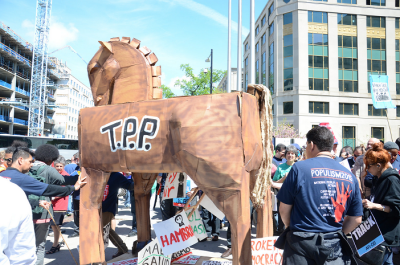
The TPP, on the other hand, has been negotiated in secret. We’ll eventually get to read the whole bill before it’s passed, but right now everything we know about it comes from leaked drafts. It is highly likely that the leaked versions we have are now outdated.
But they may not be. The point is we don’t know and we won’t know until President Obama sends the bill to Congress. At that point, the public and Congress will have 60 days–a full 2 months–to review the bill.
So let’s look at the TPP just like you’d head through Chipotle to order a burrito.
Start with the Tortilla: the Trade Promotion Authority
Like the faithful tortilla wrapping up and containing all of the contents of a Chipotle burrito, the Trade Promotion Authority (TPA) is the first step towards the TPP. Here’s why.
Trade Promotion Authority is often called “fast track authority” and it was actually started in the 1970’s. It is a presidential power that letsthe President send trade bills to Congress for a simple ‘yes’ or ‘no’ vote. Under the TPA, Congress may not make ANY changes to the trade bill nor can they filibuster it. All they can do is either accept or reject it.
This is critical for President Obama as he negotiates with other nations. Those countries don’t want to make a deal with him and then have Congress come in and muck it up. So the TPA gives the President more negotiating power.
In June, the TPA passed the Senate and will be signed by President Obama.
The Rice and Beans: The Trade Adjustment Assistance
Imagine trying to eat a Chipotle burrito without the rice and beans. It just wouldn’t be the same without that “padding.”
Likewise, with the Trans-Pacific Partnership, there’s something called Trade Adjustment Assistance (TAA). In short, the TAA is a government assistance program specifically for people whose jobs get eliminated because of overseas outsourcing or imports. The TAA also helps farmers and firms whose business is negatively impacted by the TPP.
The Meat: Barriers to Trade
The real “meat” of the TPP has everything to do with regulations. While that sounds super boring, it will affect you personally because it concerns:
- movies and music
- software
- and drugs
Regulations
Perhaps the most contentious language in the TPP drafts is about how new regulations and changes to old trade regulations will be enforced.
How Regulations Are Enforced in Trade Agreements
When countries enter into trade agreements, there needs to be a way to enforce them. The TPP will create an international tribunal that will allow foreign investors and companies to sue member nations. This is called investor-state dispute settlement (ISDS).
Why is this important?
Let’s say you own a business making microchips. You spend lots of money building a factory in Vietnam. But after your factory is built, voters elect a new government that seizes all of your business’s assets. In the US, our laws protect against that kind of thing. But in other nations, that sort of protection may not exist. ISDS would allow that company legal action to get their money and property back.
Sounds great, right? The flip side is that an ISDS could be used by large corporations to manipulate member nations and to bypass laws they don’t like. If a company doesn’t like the tax code, they can sue and claim that the nation’s policies are unfair.
Also, companies will be able to sue the United States which opponents say could undermine states’ rights and the sovereignty of our laws. However, the US is involved in about 50 existing ISDS from other trade deals and has even been sued 13 times (none of which it has lost).
Patents
Groups like Doctors Without Borders and the Electronic Frontier Foundation are concerned that the TPP goes too far in protecting patents–particularly for pharmaceutical companies.
They say the patent protections will increase the length of time before affordable, generic versions of popular drugs become available. They say this would keep the price high and could cost people their lives who need the drugs but can only afford generic versions.
Language in leaked drafts appear to indicate that companies would be able to alter their drug a little bit and then re-patent it–a process called “evergreening”–which would allow them to keep patents on drugs presumably indefinitely.
But negotiators are trying to exempt poor countries from these laws. While this would keep pharmaceutical prices low there, it wouldn’t help patients in the US.
Labor Rights
People often talk about jobs being lost overseas due to cheap labor, typically because there are few workers’ rights protections. The TPP will address this by forcing member nations to increase protections for workers. In fact, the White House has promised that the TPP will end child labor and ensure workplace safety standards.
Labor groups want to make sure that while there are more protections for workers, that there are also more effective ways to enforce those protections.
Copyrights
Language in the leaked TPP drafts may indicate that it will increase copyright protection across all member nations. While this is good for companies that produce media that is prone to piracy (like movies and software) it could make it more difficult for Congress to adapt and change laws in the US.
Lettuce, Cheese, Salsa: Strange Political Bedfellows
At the end of your order, you have to quickly choose which additional “toppings” you want in your burrito. This mash-up of different ingredients is similar to the strange political groups the TPP has brought together.
The TPP has done something incredible: it has united President Barack Obama and House Republicans. Usually, Republicans in Congress oppose nearly every single idea and bill that President Obama supports. But the TPP is different.
The President views the TPP as a chance for America to make the first move in global trade before China does. House Republicans are pro-business. They support the TPP because they believe that it will allow American businesses to more easily sell and make products overseas.
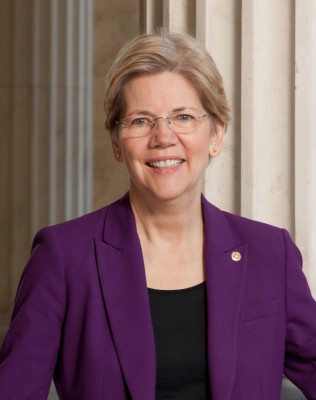 Opponents of the TPP
Opponents of the TPP
On the opposite side of the TPP is an equally motley crew of pro-union Democrats and Tea Partiers. The Tea Party sees the TPP as an unnecessary expansion of government power. Pro-Union Democrats, led by Sen. Elizabeth Warren (D-MA), want to protect American workers from having their jobs sent overseas.
Get a Beer: Why TPP Now?
The President has actually answered this question very specifically. He said, “..if we don’t write the rules for trade around the world — guess what — China will.” So his reasoning is that the TPP puts America in a better position to compete with the rising Chinese economy. Japan’s Prime Minister, Shinzo Abe, also wants the US more involved in Asian trade for the same reason.
House Republicans want the TPP right now specifically for the Trade Promotion Authority (TPA) also called “fast track.” The reason? It lasts for 6 years. If America elects a Republican President in 2016 he/she will have fast track authority for their entire first term.
The Latest News
Right now, the TPP is being negotiated on the Hawaiian island of Maui. Representatives from all 12 potential member nations are present. Representatives have said that the deal is 98% complete. The final sticking points surround the dairy trade in New Zealand, automotive trade, and the patent period for new drugs.
